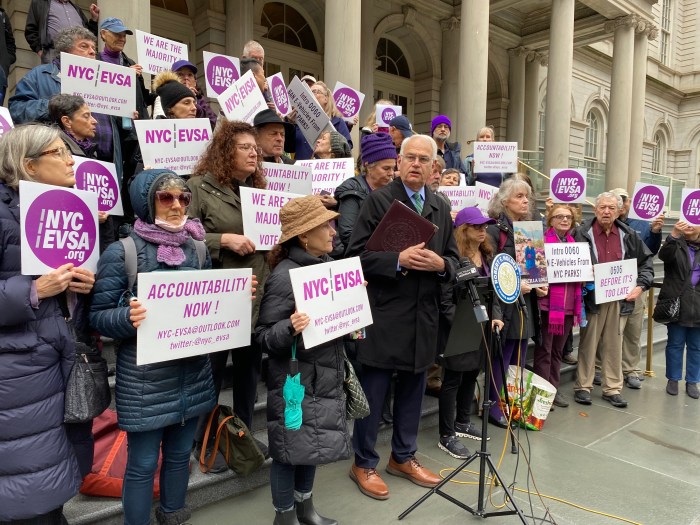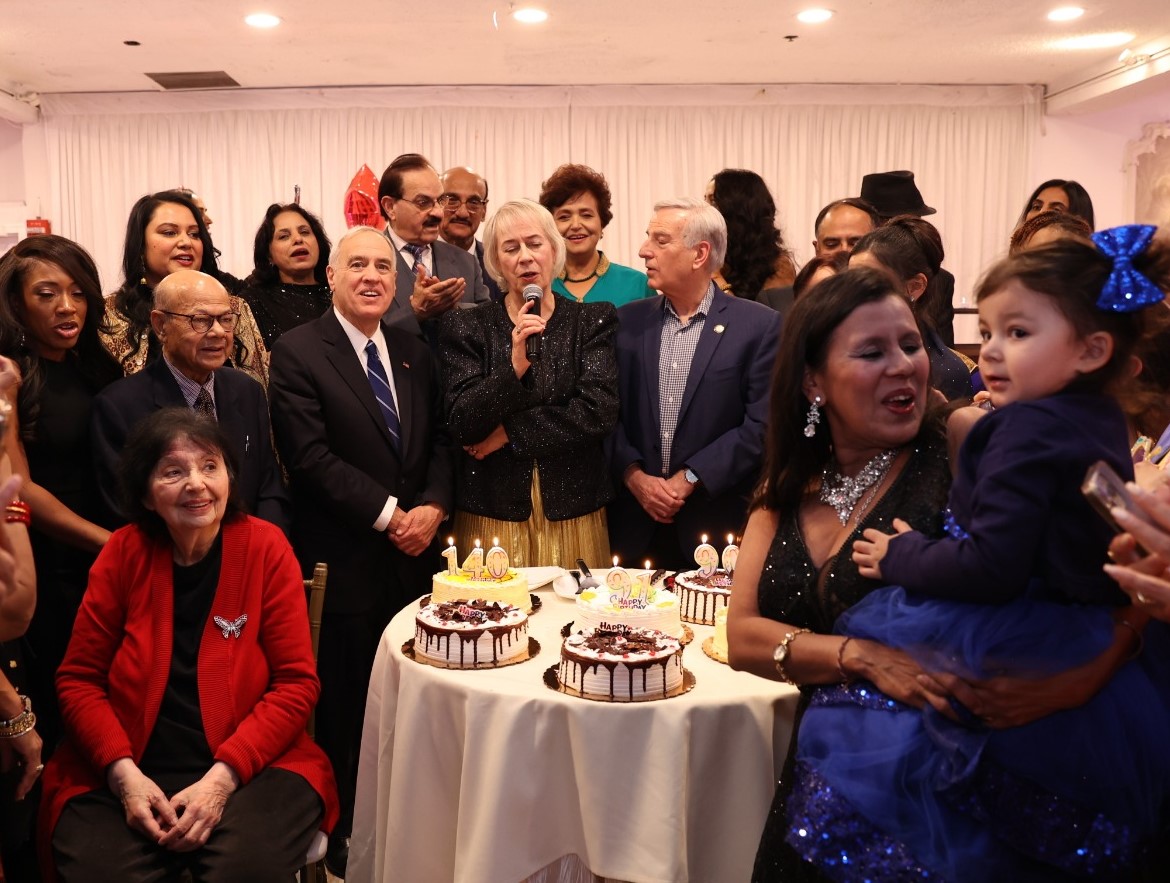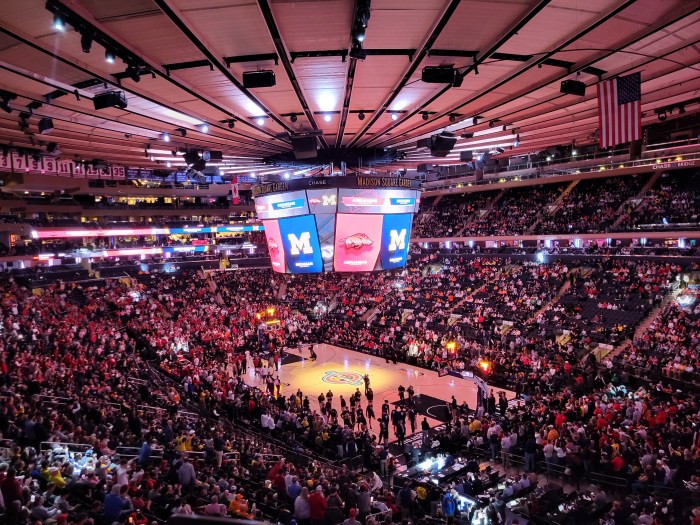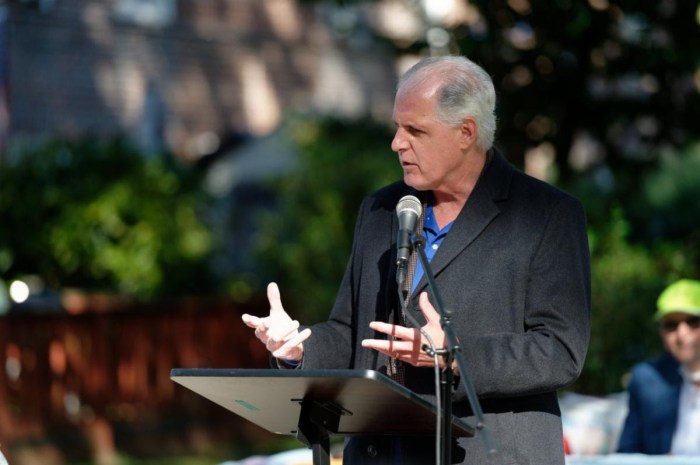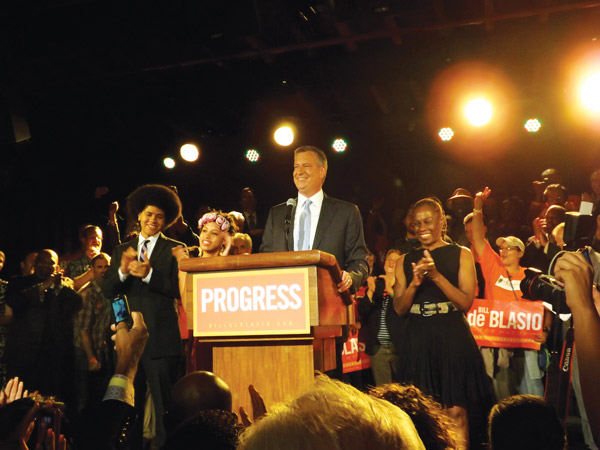
Bill de Blasio flanked by his son, Dante, his daughter Chiara, and his wife, Chirlane McCray.
BY DUNCAN OSBORNE & JOSH ROGERS | Having achieved a big plurality in the Democratic primary, with a good shot at avoiding a runoff when all the paper ballots have been counted early next week, a triumphant Bill de Blasio vowed to win City Hall on Nov. 5.
“What we achieved here tonight won’t just change the views inside City Hall,” de Blasio told supporters at a Sept. 10 celebration in a Brooklyn club not far from his Park Slope home. “It will change the policies that have left so many New Yorkers outside of City Hall….
“We are bigger, we are stronger, we are better as a city when we make sure that everybody has a shot.”
De Blasio, the city’s public advocate, was contending with four major opponents in the primary and the conventional wisdom was that a runoff was a certainty among the Democrats. But unofficial results suggested that he had won the required 40 percent of the vote to avoid the expected Oct. 1 second round.
At his campaign night gathering in Midtown, Bill Thompson, the second place finisher, said, “Tonight is for any of you who been counted out and told the world doesn’t have room for you.”
With his supporters shouting, “Three more weeks!” Thompson was hoping de Blasio would fall below the 40 percent threshold by the time paper ballots are counted early next week. But pre-primary polls had Thompson losing badly to de Blasio in a runoff match-up.
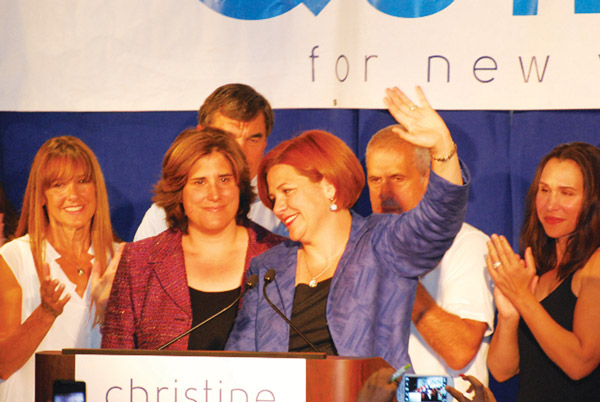
Quinn waves to supporters as she concedes defeat in the mayoral race.
In Lower Manhattan, de Blasio’s main competition was City Council Speaker Christine Quinn, but he appeared to beat her in many of the election districts below Canal St. including at Southbridge Towers, where he won 266 -157, according to unofficial tallies, and at least one in Tribeca.
“I think he’s a good dude,” Bill Rhem, a younger Southbridge voter, said of de Blasio. “I’m a pretty liberal guy — he’s all for raising rates on the top earners.”
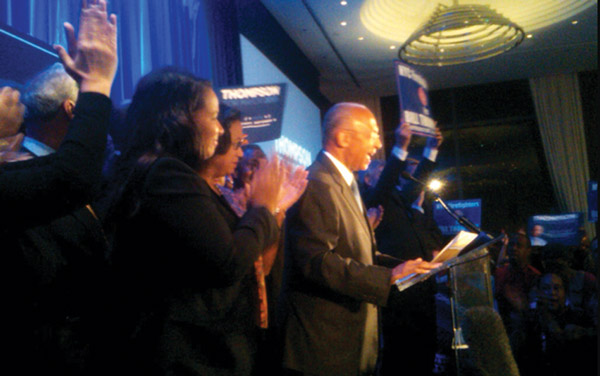
Thompson did not concede as the results are still being tallied for his mayoral run.
De Blasio took 41% of the Lower Manhattan vote, Quinn won 34% and Thompson 13%, according to the New York Times.
A good number of Downtown voters volunteered they were looking for an alternative to Quinn because she was too close to Mayor Bloomberg, and many of them settled on de Blasio.
But in Tribeca, a few said they were disappointed Bloomberg was not on the ballot.
“I’m a Bloomberg fan,” said Dana Buchman. “He showed courage, vision and intensity.”
But surprisingly, Buchman voted for de Blasio, even though he has received Bloomberg’s sharpest criticisms.
If he avoids a runoff, de Blasio could immediately set his sights on Joe Lhota, the former deputy mayor in the Giuliani administration who easily won the Republican nomination for mayor.
Lower Manhattan has few registered Republicans, but Lhota might have done better there than the rest of the city. For example, in one Tribeca E.D., he beat John Catsimitidis 25 -1.
Annie Sullivan of Battery Park City said she voted for Lhota because she was very pleased with the way the city had evolved under Bloomberg.
“I never imagined raising children here, but the city has become so lovely,” she said. “It would be a shame for it to change.”
Lhota is presenting himself in the mold of Rudy Giuliani and Michael Bloomberg –– fiscally disciplined and liberal on social issues. That has been a potent image in recent elections. Together, Giuliani and Bloomberg have occupied City Hall for the past 20 years.
In his remarks, de Blasio amplified his campaign theme –– a “tale of two cities.” He said a small number of wealthy New Yorkers have benefited from city policies and a far larger group of New Yorkers have been left behind. New York has become a city in which “luxury condos have replaced community hospitals” and “proactive policing has become racial profiling.”
The reference to luxury condos was hammered home in the campaign’s final weeks to emphasize the loss of St. Vincent’s Hospital and the redevelopment of the site by Rudin Management in Quinn’s district.
Exit polls show de Blasio bested Quinn, who is a lesbian, in the L.G.B.T. community.
In her own geographic base, de Blasio beat Quinn by a 42-39 percent margin in Chelsea and a 50-34 margin in the West Village.
“We all care deeply about this city,” the speaker said of the Democratic primary field. “We share the goal of greater opportunity for every New Yorker in every neighborhood.”
Noting the historic significance that a victory would have had, she talked about “a young girl out there” who could say, “I can do that,” and the lifeline it would have sent to “a young L.G.B.T. teen out there who’s doubting themself for who they are.”
Quinn’s result was stunning. Quinn had worked very hard, seemingly successfully, for several years to boost her profile citywide. Six months before the primary she was seen as the inevitable nominee, though even Quinn conceded that a runoff was unavoidable. She finished with just 15 percent of the vote.
While recent polls suggested that de Blasio had a significant lead heading into the Democratic primary, those same polls had repeatedly shifted in the months leading up to September 10. An exit poll by Edison Research Services indicated he had cobbled together an impressive coalition to win the primary.
Forty-one percent of women voted for de Blasio as did 42 percent of African-American voters. The greatest surprise in the exit poll was that 47 percent of lesbian, gay and bisexual voters backed de Blasio while only 34 percent supported Quinn, who has represented Chelsea and the West Village for 14 years.
The turnout in the primary was moderate, with between 600,000 and 700,000 New Yorkers voting, and de Blasio snagged the votes of roughly 260,000.
Thompson, the former city comptroller, who had 26 percent of the vote, emphasized that every vote needs to be counted. Other contenders, such as John Liu, the current comptroller, and Anthony Weiner, the former congressman, were in the single digits.
Democrat Anthony Weiner, whose poll numbers plummeted after reports that his sexting behavior persisted after he presented himself as a changed man, did not lose all of his support.
Keith Mackie, 24, of the East Village, said he and a few of his friends voted for Weiner. “I don’t think he’ll win,” he said, “and I thought it would be funny.”
OTHER RACES
Two candidates with strong Downtown ties were on the ballot and they both appeared to win Lower Manhattan overwhelmingly.
That support helped propel State Sen. Daniel Squadron into a probable runoff with Councilmember Letitia James in the public advocate’s race, but it was not enough to help Julie Menin, former Community Board 1 chairperson, win the borough president’s race.
Menin finished fourth, losing to Councilmember Gale Brewer from the Upper West Side. Brewer appeared to come in second place Downtown.
Borough President Scott Stringer beat Eliot Spitzer in the Democratic primary for city comptroller.
With reporting by Kaitlyn Meade, Paul Schindler, Tequila Minsky, Andy Humm, Heather Dubin and Terese Loeb Kreuzer



